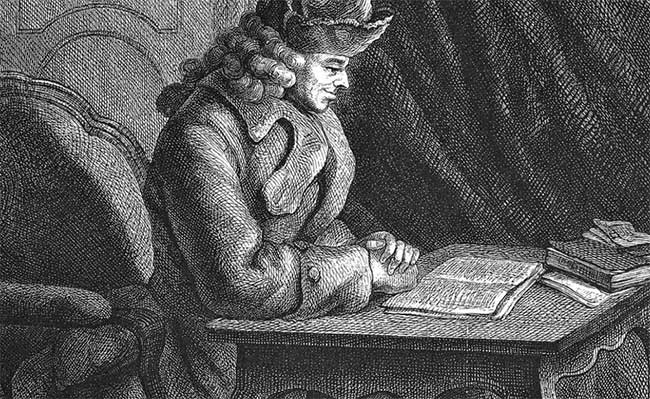If you think that people like Voltaire only knew how to write poetry and literature, you are mistaken. Behind this famous philosopher lies a remarkably sharp mind when it comes to finance.
Voltaire (1694 – 1778), whose real name was François-Marie Arouet, was a French writer, author, commentator, theologian, and philosopher. He is one of the most influential figures of the Enlightenment in 18th-century France, with an extensive body of work that includes novels, essays, plays, and numerous scientific treatises.
Although he was a writer, Voltaire was not just skilled in writing. He was also very astute in investments and had a natural business acumen—something proven by a unique lottery win that made him wealthy for life.
An Unusual Incident Becomes Voltaire’s Unexpected Fortune
In 1729, France plunged into a financial crisis, and the French government opted to issue bonds. To encourage the public to purchase more bonds, the leaders devised a creative solution: the lottery.
Only those who bought bonds had the right to purchase lottery tickets, and Voltaire was one of them. At that time, he was facing financial difficulties.
The story began when he met his friend, mathematician Charles Marie de la Condamine, at a dinner. To help Voltaire make quick money, de la Condamine told him about a loophole in the French lottery system.

Portrait of Voltaire. (Photo: History).
The issue lay in the lottery tickets, which were worth 1/1000 of a bond. Those with a bond worth £100,000 could buy a ticket for £100, while those with a £1,000 bond could buy a ticket for £1.
If one won, they would receive a sum equivalent to the value of the bond they held. Additionally, winners would receive a jackpot prize of £500,000. (At that time, the French used the livre, and only after 1795 did they adopt the franc).
£500,000 was an enormous amount at that time. To put it into perspective, someone with an annual income of £15,000 was considered wealthy, while £30,000 was regarded as extremely wealthy. If converted to today’s exchange rate, £500,000 would be equivalent to approximately $121 million.
The odds of winning the jackpot were the same, whether one spent £100 or £1 on the lottery. Moreover, the French government did not realize that the prizes they were awarding… were even larger than the total revenue from all the lottery tickets!
The mistake of the French government ultimately became an unexpected fortune for Voltaire.
Planning and Executing the Scheme
According to de la Condamine’s calculations, as long as they purchased a sufficient number of bonds in the market, they would certainly win the lottery. The cost of buying lottery tickets was not high (£1/ticket); they would also receive interest and the actual value of the bonds that the French government offered as prizes.
To successfully execute this scheme, the duo needed to rally many investors to buy enough bonds to ensure victory. This is where Voltaire took action. At that time, this philosopher was neither wealthy nor famous, but he was exceptionally eloquent and well-connected.
Voltaire and de la Condamine successfully invited wealthy investors to join them, thereby securing enough capital to purchase bonds and lottery tickets. The only obstacle was that there were only a few notaries issuing lottery tickets. If one person came to collect tickets too many times, the scheme would quickly be discovered by the government.
Once again, Voltaire demonstrated his quick thinking by convincing one notary to act as an insider and issue tickets for their group.
Initially, the plan was a resounding success. Group members earned substantial profits, sharing them fairly and generously compensating all involved parties. To be cautious, they signed for prizes using various aliases, so no one realized that this group was “lucky” enough to win the lottery repeatedly.
The remarkable “lottery win” unfolded over two years, before being partially exposed by Voltaire himself. The simple reason was… he wanted it that way.
Typically, people write well-wishing messages on the back of lottery tickets. However, Voltaire chose not to do that.
Instead, he revealed part of the plan and the names of the individuals involved, such as: “This ticket is dedicated to the brilliant ideas of Marie de la Condamine.” Afterwards, Voltaire signed the ticket using a series of aliases that the group continued to use.
Eventually, the French government recognized the loophole that had long existed in its lottery system. They quickly guessed which group was behind this scheme. The French Minister of Finance at the time even sued Voltaire and his associates in court. However, since the group had done nothing illegal and the system was poorly constructed, the court allowed them to keep all their winnings.
The Investment Genius of a Talented Writer
Subsequently, the French government “dissolved” this lottery system after Voltaire’s scheme was exposed. They even tried to change the laws, but by then Voltaire had accumulated over half a million livres and had become extremely wealthy.
Of course, being astute, Voltaire did not spend this money immediately; instead, he used it to invest and “buy” his freedom.
He began to associate with the wealthy elite, investors, and bankers. They taught him how to invest, predict currency trends, and manage expenses.
In September of that year, Voltaire heard about a promising company in Lorraine that was about to issue shares. However, the company only accepted investment capital from local residents. After some research, he asserted that Arouet in his real name had roots in Lorraine.

Voltaire’s Rapid Wealth Accumulation. (Photo: Kristeligt Dagblad).
“After my urgent pleas, they allowed me to purchase 50 shares and transfer the funds a week later. I quickly seized this opportunity and tripled my investment,” he wrote in a letter.
Voltaire’s fortune grew even more when he secured an inheritance. Previously, the writer had conflicts with his father and was nearly left out of the will. However, perhaps out of reluctance, his father set a condition: Voltaire would receive a portion of the inheritance if he could prove in court that he had been a good person after the age of 35.
That year coincidentally matched the timeline mentioned in the will. Voltaire used his persuasive skills to successfully convince the President of the Court, Jean-Aymard de Nicolaï, to restore his inheritance rights. Strangely enough, this was the same person who had previously refused to lend him £20,000 from his inheritance four years earlier.
The inheritance of £153,000, along with his prior savings, allowed Voltaire to create freely without having to bow to anyone. His wealth enabled him to live comfortably even while fleeing the wrath of city authorities or when he was exiled from Paris. Without this money, Voltaire might have faced the fate of being “decapitated” or imprisoned for life.
At the age of 55, Voltaire’s annual income was £80,000 (equivalent to $600,000 today). He also earned an additional £45,000 a year from passive investments around the world (equivalent to $337,000 today).
Regarding his wealth and life largely based on passive income, Voltaire stated: “God has given me the gift of life; I must allow myself to live comfortably.”


















































